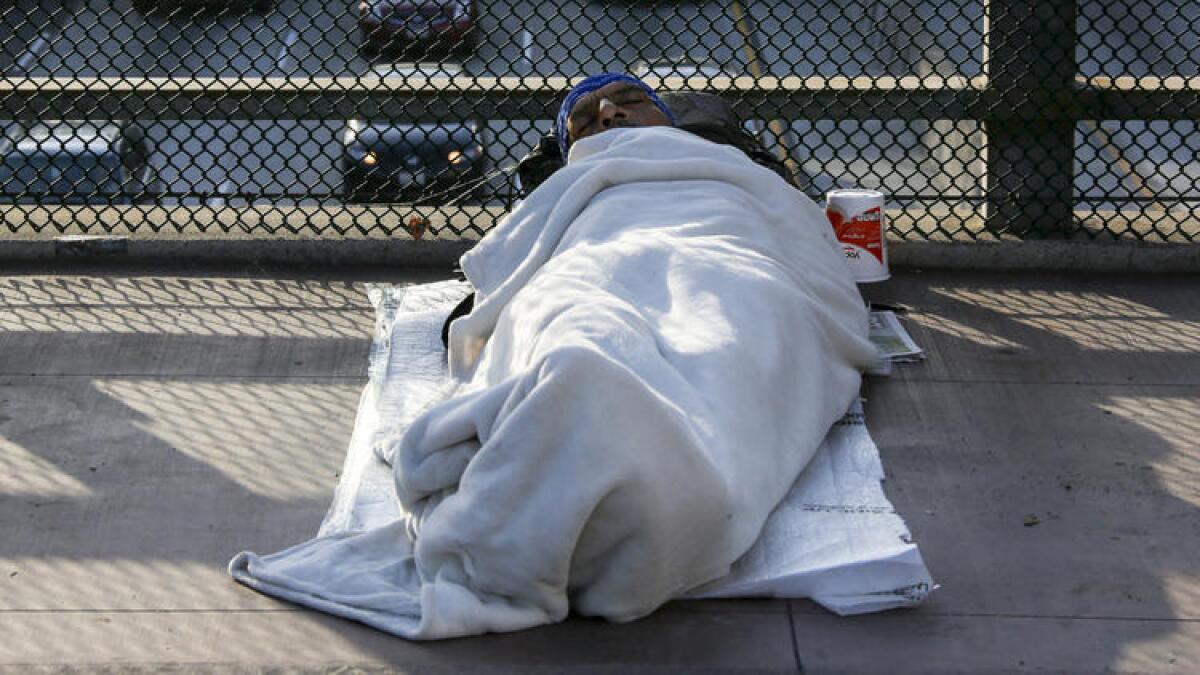Report outlines L.A.’s options for funding fight against homelessness

A homeless man sleeps on a bridge over Main Street in downtown Los Angeles.
- Share via
Borrowing money or establishing a new tax would be the most effective ways for Los Angeles city officials to raise the money needed to carry out an ambitious plan for reducing homelessness, according to a report issued Friday by city analysts.
The report from City Administrative Officer Miguel Santana and Chief Legislative Analyst Sharon Tso found that issuing a bond, increasing the sales tax or raising the documentary transfer tax would be the most lucrative measures the city could adopt to fund services and long-term housing for tens of thousands of homeless men and women.
A bond could generate more than $1 billion to build housing, and the taxes each would raise more than $100 million annually, the report estimated. All three options would require two-thirds approval by city voters in either November of this year or March 2017.
The report outlines in greater detail the funding options available for the homelessness plan adopted by the City Council and Mayor Eric Garcetti. The plan calls for more than $2 billion to be spent over a decade.
“There’s greater awareness about it than ever before,” Santana said Friday of L.A.’s homeless population, which grew 12% from 2013 to 2015, to about 26,000. “And for the first time, there’s actually a path forward.”
The report released Friday affirms a growing consensus at City Hall that a new, voter-approved revenue measure will be necessary to tackle homelessness. It also makes clear that some ideas are more remunerative than others.
For example, the report found that a funding approach favored by Garcetti -- a recording fee on real estate documents -- would be among the less-fruitful approaches to raising money for the homeless, bringing in an anticipated $30 million per year. Santana and Tso also state that the city may not have the legal authority to enact the fee independently of the county.
In a statement, Garcetti did not address the questions city analysts raised about a document recording fee and declined to say whether he had any preferences among the funding alternatives outlined in the new report.
“The urgency of this crisis requires all options on the table including those that would require the support of voters at the ballot box,” Garcetti said. “I believe that Angelenos will continue to support these measures and want to ensure long-term funding solutions that can get the job done.”
Other potential taxes that would generate less revenue include a levy on billboards, generating an estimated $24 million annually, or a marijuana tax that would bring in about $17 million per year, according to the report.
The report also suggested funding alternatives that would not require voter approval. Among them are a proposal by Garcetti to establish “linkage fees,” which are applied to residential and commercial real estate development to fund affordable housing. Such fees would bring in $38 million to $112 million annually, the report states.
The mayor and the City Council could also avoid a ballot initiative by allowing developers to pay a fee, to be used for homelessness initiatives, instead of meeting existing requirements for including affordable housing in new projects.
The council’s homelessness committee is scheduled to discuss the report next week.
ALSO
Lufthansa jet and drone nearly collide near LAX
Death of high-rise worker in downtown L.A. investigated as possible suicide
Orange County district attorney’s office can stay on case despite courthouse brawl
More to Read
Sign up for Essential California
The most important California stories and recommendations in your inbox every morning.
You may occasionally receive promotional content from the Los Angeles Times.











